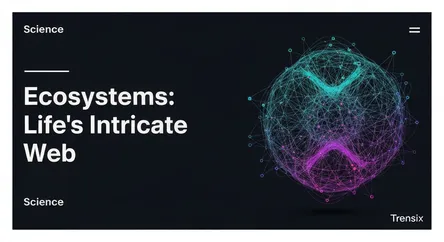Science
Ecosystems: Life's Intricate Web

Discover what an ecosystem is, from tiny ponds to vast forests, and learn how these complex networks of life support our planet and human well-being.
What is it?
An ecosystem is a biological community of interacting organisms and their physical environment. It includes all the living things (biotic factors) like plants, animals, and microbes, as well as the non-living things (abiotic factors) such as climate, soil, water, and sunlight. These systems can be as small as a tidal pool or as vast as a desert or rainforest. Within an ecosystem, energy flows through food webs, and essential nutrients are cycled, creating a complex, interconnected web of life where every component plays a vital role in maintaining balance.
Why is it trending?
The term ecosystem is increasingly trending due to heightened global awareness of environmental issues like climate change, pollution, and biodiversity loss. News about deforestation in the Amazon, coral bleaching in the Great Barrier Reef, and widespread wildfires highlights the fragility of these systems. As scientists provide more data on the tipping points of critical ecosystems, the public and policymakers are paying closer attention to the concepts of conservation, restoration, and sustainability, making the health of our planet's ecosystems a central topic of discussion.
How does it affect people?
Healthy ecosystems directly support human survival and well-being by providing essential "ecosystem services." These include producing the oxygen we breathe, purifying our water, pollinating crops for food, and regulating the climate. They also provide resources like timber and medicine, as well as recreational and cultural benefits. The degradation of ecosystems threatens these vital services, potentially leading to food and water insecurity, increased vulnerability to natural disasters like floods and droughts, and a significant impact on global economies and public health.